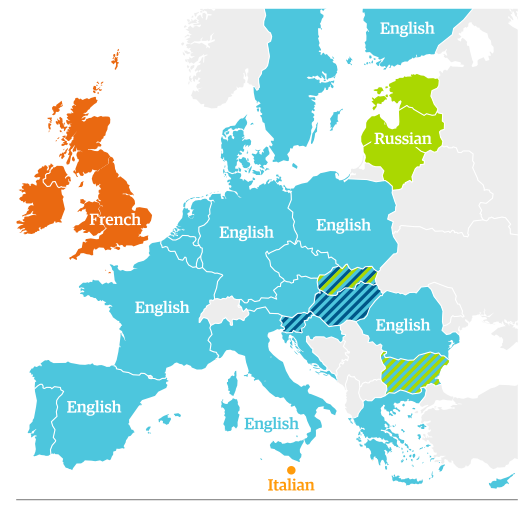English-Speaking People Don’t Speak Second Languages
Americans have long been lampooned for not speaking a second language. Now our cousins across the Pond are getting it, too.
Americans have long been lampooned for not speaking a second language. Now our cousins across the Pond are getting it, too.
Guardian (“Most Europeans can speak multiple languages. UK and Ireland not so much“):
Just over half of Europeans (54%) are able to hold a conversation in at least one additional language, a quarter (25%) are able to speak at least two additional languages and one in ten (10%) are conversant in at least three.
The five most widely spoken foreign languages remain English (38%), French (12%), German (11%), Spanish (7%) and Russian (5%). Almost everyone in Luxembourg (98%), Latvia (95%), the Netherlands (94%), Malta (93%), Slovenia and Lithuania (92% each), and Sweden (91%) are able to speak at least one language in addition to their mother tongue.
Countries where people are least likely to be able to speak any foreign language are Hungary (65%), Italy (62%), the UK and Portugal (61% in each), and Ireland (60%).
They’re still way ahead of the US, where most estimates have only 18 to 25 percent speaking a second language–although some think the numbers would be higher if the right questions were being asked.
Regardless, the answer as to why the English-speaking countries have such a deficit is obvious. This map that accompanied the Guardian piece is amusing:
Anywhere an Englishman is likely to go, then, they’re likely to encounter people who speak English. Given that the United States is almost as large as all of Europe—and has predominately English speaking and even larger Canada to its north—it’s even more the case here.







We’ll the US is pretty deplorable when it comes to teaching a second language but one key to knowing a second language is being able to use it.
People in Europe have English speaking visitors and English TV shows and Movies.
People in the US mostly hear English outside of a few areas heavy in immigrants.
I see no need to call out Americans for not learning a second language. It simply is not necessary. If you learn another language, good for you! But any efforts to make me feel less of a person because I don’t are doomed to fail.
The problem is that English has become the default language of Business in much the same why that french was the language of diplomacy. in the 17th – 19th century. as a non-English speaker I have one overwhelming choice of a 2nd language to pursue … English; nothing else is even on the radar unless there is a local language that that you need and use.
As an English speaker in the international realm what should I lean that would be even passably helpful? Also Europeans have an “advantage” since there are so many languages packing to an area smaller then the US. I imagine that US speakers of Spanish as a 2nd language have increased over the years due to it’s usefulness, but even then you are spending a lot of time to communicate with people you don’t come into contact with all that often. If i were more of an international traveler I would make a 2nd language a higher priority but I don’t so …
I would argue that the US populations low 2nd language skill is less a matter of lazy and more a matter of low to non-existent necessity. However I would venture a guess that the US has some of the highest rates of people who speak Klingon and Elvish.
@John Peabody and @Rick DeMent pretty much have it right. Americans don’t learn a second language because we don’t have to. English is the default language of business and has been for a long time.
I speak passable German, but that’s only because I spent nearly seven years there and took an interest in learning it. Had I been one of those GIs who hung around the barracks all the time, I wouldn’t have needed to learn any German beyond what it took to ask for a beer or where the train station is.
My wife already spoke English when we met, and her English has always been better than my German, so we’ve defaulted to English since the beginning.
Sometimes it’s a choice, sometimes it’s not…
I don’t believe that any of the Baltic states would choose to speak Russian as a second language, if they had their druthers.
I took two years of German in college and spent the spring semester of my junior year of college in Germany. By the end of the semester, I was pretty close to fluent, but it was a struggle mostly because 95% of the people I interacted with in Germany wanted to speak English with me. Until the very end of the semester, my German apparently had a pretty obvious American accent to it, and people would immediately switch to English as soon as they heard me speak. Everyone always says immersion is the best way to learn a language, but it’s not really immersion if the entire local population wants to practice their English. I eventually started just being honest and asking people to speak German so I could learn.
I could probably still hold a conversation in German today, but my fluency has faded a ton since I almost never get the chance to speak it with anyone.
Learning a second language is good. It inspires you to be a better speaker on your native tongue, your brain seems to work better. It´s true, if your native tongue is English there is less of a incentive to learn a second language. On the other hand, Spanish is a Romance Language that shares it´s structure with various other languages(Portuguese, Italian, French in special), and there are millions of Native Spanish Speakers in the US.
And yes, I think that´s it should be worrying the absence of people that speaks a second language in the academia and on think tanks in the US. I know that James that works in both of these fields does not speak a second language: but I´m not judging him.
Sim, aprender uma segunda língua é muito bom.
@Rick DeMent:
English is not just the language of business. It’s the language of computing, of aeronautics, and, largely, of science.
In much of the world English is the preferred language of instruction in medical schools. Not only is that true in the old Commonwealth nations, e.g. Pakistan, India, Nigeria, but in much of the Middle East, i.e. Iraq, Egypt, etc.
@Rick DeMent: “As an English speaker in the international realm what should I lean that would be even passably helpful?”
Mandarin.
Not to mention, English is egalitarian. It doesn’t have gender seething through its grammar, like Spanish, French, etc. It is the same whether high or low born, unlike German. It is the language for those who believe and promote equality between the sexes and who throw off classist society.
Fascinating set of responses. Basically all “hey, let them all speak English, I’m cool.”
Only you’re not cool. Because language is more than just a different set of words. Languge defines the way its speakers think. Learning a language not only teaches you how that culture works, far more importantly it teaches a lesson that many Americans — and just about all right wingers — have serious trouble understanding: That other people actually see the world differently.
So yes, I’m sure you can get through life without ever learning a word that isn’t English. But you’re impoverishing yourself.
@Ben:
Last year, shopping in a store in Nuremberg. My wife was talking to my son in English right before we paid for our items. She turned to the cashier and began speaking in German.
The cashier said, “Oh, no, I wanted to practice my English! Can we speak in English?”
We all had a chuckle and completed the transaction in English.
@Liberal Capitalist:
No, indeed, it used to be German. Up until WWII there was a large ethnic-German and German-speaking population there.
@wr:
Eh, not really. All the relevant Chinese business people speak English.
One other unaddressed reason for the fact that native-English speakers don’t need to learn another language is that for non-native English speakers, English is how they communicate with each other. If a Polish lawyer is doing business with an Egyptian, or a Japanese firm is bidding for a contract in Spain, or a Norwegian businesswoman is communicating to the staff at her hotel in Thailand, then all of those conversations will be in English.
@Dave Schuler:
And of travel. All international pilots must be able to communicate in English to speak to flight control towers.
@wr:
That’s true, but that points up the reason for this imbalance: for most people who want to travel and do business, study, work, etc. in the modern world, learning English is a necessity. And the choice is predetermined, whether you’re Chinese, Japanese, German, Cambodian, Honduran, etc., your most useful second language will always be English.
For native English-speakers, learning any one single second language isn’t a necessity — it’s a luxury. It would be nice, it would be helpful, it would be useful, yes, but it’s not all that necessary. And there’s no consensus on what that second language should be – French? Mandarin? Spanish? etc.
@Ben:
Great observation.
Most Brits are able to speak Yorkshire, Liverpool, and whatever it is that the Scots do when they think they’re speaking English.
I will add my story to that of Ben and Mikey. I’ve been living in Korea since 2007 and my Korean allows me to ride in taxis, order at restaurants and not much else. Mostly, I don’t study hard enough (my students have the same problem), but there are other factors, too.
A few weeks ago, I was at a large discount store food department. At a concessionaire’s stand, I waved to the worker and said “yeogiyo” (Korean for “over here”–what one says when they want attention) after about three minutes of being ignored, I continued on my way. A few minutes later, I decided to try again, but this time, I said to no one in particular, “can somebody help meeee?” Within seconds 4 employees and 2 customers were hovering over me trying to help me get what I had wanted 10 minutes before.
There is some value for a young child to be exposed to other languages. It does help broaden their mental development. To spend time learning a non-English language as an adult is a waste of time. Assuming one has not moved to a place where such language is in predominant use in daily consumer interactions.
We often teach children many things that would be a waste of time to teach an adult. This is to aid in their development. But such development is done with in an adult. Adults should learn only those things that can be of use to them as learning to develop mental pathways is almost impossible.
@Rafer Janders: “Eh, not really. All the relevant Chinese business people speak English”
Because the only business people you find relevant are the ones you can communicate with in English.
And perhaps even some of these relevant Chinese business people will choose to do business with someone who has taken the trouble to learn their language over one who hasn’t.
There was a time when Americans could afford to be this arrogant. That time is long over.
@JKB: “Adults should learn only those things that can be of use to them as learning to develop mental pathways is almost impossible.”
Because knowledge is such a terrible thing it should only be acquired when it’s necessary to make money.
Ladies and gentlemen, I present the core thought of Republicans everywhere.
@JKB: I strongly disagree. One of the best things an adult can do is try to learn a new language. It’s way tougher for an adult than for a kid, but it’s exactly the kind of thing that keeps an older mind more youthful.
Twenty (?) years ago I saw a TV news story about NYC cabbies complaining about the recent influx of foreign hacks.
One American complained: “We don’t need drivers that don’t speak no United States!”
@wr: As someone who is currently learning mandarin, I would note it is not a pick up a second language to better oneself language. I only speak it because the research lab I work in, in Iowa is populated entirely with Chinese nationals. They won’t speak english to me an hour a day to help me practice. All that said the tonal qualities to this language is insane. Especially if you don’t have an ear for it. Mandarin is very unlike learning spanish or french as a second language. That is even without getting into reading and writing. Each character has to be written in a set stroke order. On top of that none of the mainland Chinese I know can read the non-simplified characters in use in Taiwan. I agree that if people have the time and want to better themselves learning a second language is great. I disagree that mandarin is a default that should be learned instead of say spanish, because without someone to speak to you and correct you with tones it seems impossible.
@Dave D: I think most East Asian languages you have to learn to listen to before you can learn to speak. As for learning to write them, yikes.
Found this online, which confirms my suspicions. Japanese is even listed as exceptionally difficult for category 5.
it’s not because of “englishmen”- it’s because Americans speak it, and if you want to do business with us then you best speak the language. wish i took spanish instead of french, but i grew up where the hiway signs were in french too- damned canucks!
@Pinky: Hah. The only way to learn Japanese is total immersion. And pounding it into your head 14 hours a day will get you to the point of being able to START learning the language at the end of one year.
Part of the problem is that most of the concepts in Indo-European languages (Direct Object, Indirect Object, noun, verb, present, past, future) either don’t work or are radically changed in Japanese. Which means you have to keep pounding Japanese into your brain until it gives up, says “oh what the hell” and you start learning Japanese as a language over from the very beginning. And even after 10 years working in Japan, speaking and reading/writing Japanese every day, I never got to the ease of feeling I have with another Indo-European language like French (where I got to the point where I’m babbling away in French and not realizing I’m doing so.)
Which is why Japanese and English occupy two very different chunks of my brain and it’s murder for me to translate from one to the other. I can be zonked out of my head and babble along in Japanese, no problem. Get one drink into me and going from one to the other is impossible. (Not to be helped when you’re out at a dinner bash and trying to interpret between a bunch of Americans and a bunch of Japanese from Osaka who are nattering along in Kinki-ben and everyone is sloshed as a newt.)
@wr:
Well, yes. If a Chinese businessperson doesn’t speak at least some English, then he’s not a very well-educated or well-positioned or well-advantaged Chinese businessperson.
Eh, they’ll generally choose to do business with the person who can make them the most money.
It’s not arrogant, it’s practical. And for the record, I speak three languages myself and have spent a third of my life living in Europe, Asia and South America. All told, I’ve lived in countries where eight major languages were spoken. It would have been impractical, if not impossible, for me to learn eight new languages — and I generally didn’t have to. English sufficed for most needs.
@grumpy realist: “Which is why Japanese and English occupy two very different chunks of my brain and it’s murder for me to translate from one to the other. ”
I’ve noticed that translations from Mandarin to English are generally terrible — I’m not talking about literary translations, but signs and instructions and the such like — and feel that there is something incompatible about the way the two languages work. Since I don’t know Mandarin I can’t tell what it is, but it must be something fundamental.
@Rafer Janders: “If a Chinese businessperson doesn’t speak at least some English, then he’s not a very well-educated or well-positioned or well-advantaged Chinese businessperson.”
I’ve met a lot of people in the Chinese film/tv/internet business who don’t speak English, or speak only a tiny amount. And they’re doing just fine. Because they’ve got a built-in market big enough to sustain a bigger industry than ours once it matures.
@wr: It occurs when two languages are incommensurate with each other. If I’m translating from Japanese, my first draft always is ends up at total Japlish and I have to put it aside and think in English for a few days before editing it into something approximating passable.
On the other hand, I can flip back and forth between Italian and French extremely easily, to the point where it’s been easier for me to work with an Italian-French dictionary rather than Italian-English.
And I’m cranky enough that I want to go back to having the international language be Latin….
@Andre Kenji: Muito bem, senhor!
@Andre Kenji: Voce mora no Brasil, sim?
@grumpy realist: Latin is the wise and noble elder of the town. English is the local tavernkeeper. He knows everyone, he takes and passes along gossip from travelers, he’s got…uncertain parentage, and he’s probably running something illegal out of his back room. French is the inbred aristocrat living in the crumbling castle.
@wr:
Great for them. But I’m in finance, and if you don’t speak English, you’re out of the game.
@Pinky:
Actually, English is the local whore — she’ll take in anything if it pays.
My daughter spent the summer taking classes in Taiwan and she picked up enough to order certain foods, get directions to the T and thank you. She found that most of the people she dealt with spoke and understood English well enough that it was generally the default.
I know a lot of college business schools now encourage students to learn Japanese or Mandarin.
In the US however Spanish would probably be the best choose if you just wanted to pick up a second language and it be somewhat useful.
I have to quote this:
–James Nicoll
None of this would be an issue if our elementary schools taught a couple of foreign languages — it doesn’t really matter which ones — to everyone. Our kids would grow up multilingual, and once you speak 3 languages the next few are easy.
The problem is that, despite the fact that kids learn languages automatically and effortlessly, to adults this sounds like child abuse. Foreign languages are “advanced” study, so kids need to wait “until they’re ready for it”. Pah.
My American public school education was pretty awesome, all told, but in foreign languages it was pathetic. (Bizarrely, Omaha was teaching French to 3rd graders in 1970, but the elite DC-area school district we moved to next made kids wait until 7th grade…)